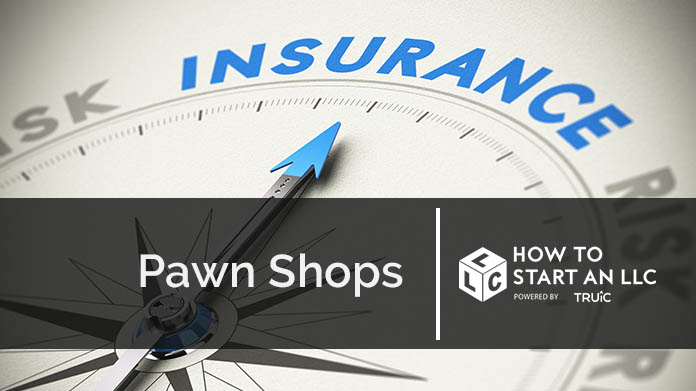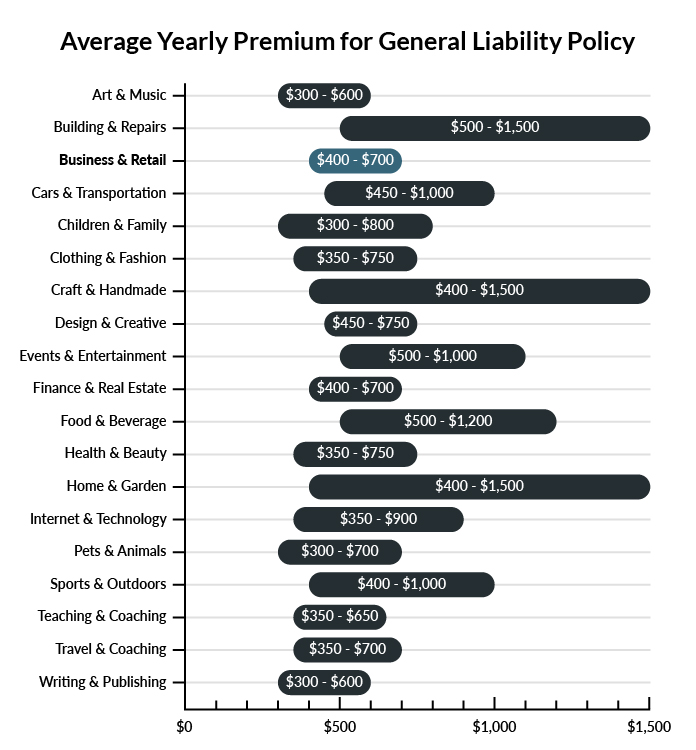Pawn Shop Business Insurance
Getting insurance for your pawn shop is essential.
Pawn shops need to be protected against things like claims of property damage, personal injuries, and employment disputes.
For example, one of your employees could become sick or injured at work, or your store’s inventory could be damaged in a flood or fire.
We’ll help you find the most personalized and affordable coverage for your unique business.

Recommended: Next Insurance is dedicated to matching small businesses with the right policy at the best price.
Best Insurance for a Pawn Shop
General liability insurance is — generally speaking — one of the most important insurance policies for pawn shops.
Some of the risks general liability insurance covers are:
- Bodily injury
- Property damage
- Medical payments
- Legal defense and judgment
- Personal and advertising injury
Since general liability doesn’t cover all of the risks your pawn shop might face, you will likely have to invest in some of the following policies:
- Data breach insurance provides coverage for legal fees and any resulting judgments if a hacker steals your clients’ online information and you are sued.
- Commercial property insurance covers all of the property your company uses, including computers, printers, and other equipment. It also covers store inventory and the store itself.
- Commercial auto insurance is necessary for company vehicles, as accidents that occur while on the job won’t be covered by standard auto insurance.
There are two types of insurance providers that may be suitable for your pawn shop: traditional brick-and-mortar insurers, such as Nationwide or The Hartford, and online insurers, such as Tivly or Next.
Online insurers are particularly beneficial for small businesses since they offer the same high-quality coverage as traditional insurers but at a lower fee.
Let’s Find the Coverage You Need
The best insurers design exactly the coverage you need at the most affordable price.
Cost of General Liability Insurance
On average, pawn shops in America spend between $400 – $700 per year for $1 million in general liability coverage.
Compare the average cost of general liability insurance for a pawn shop to other professional industries using the graph below.
Several factors will determine the price of your policy. These include your:
- Location
- Deductible
- Number of employees
- Per-occurrence limit
- General aggregate limit
You may be able to acquire general liability insurance at a discounted rate by purchasing it as part of a business owner’s policy (BOP) rather than as a standalone policy.
A BOP is a more comprehensive solution that includes multiple forms of coverage, such as business interruption and property insurance.

Find the Best Rate
Discover the best coverage at the lowest rate in our cheapest business insurance review.
Common Situations That General Liability Insurance May Cover for a Pawn Shop
Example 1: While you’re helping a customer, they go to reach for a record player on a high shelf. Unfortunately, the shelf wasn’t secured properly, and it comes crashing down on their head, resulting in serious injuries. Your general liability insurance policy will likely cover their medical bills and any related legal fees.
Example 2: A customer is browsing in your TV section and trips over an extension cord, falling and breaking their wrist. The customer is very upset and threatens to take you to court. General liability insurance will likely pay for their medical costs, your legal fees, and any payouts in a settlement.
Example 3: You decide to revamp your logo. You change your external signs, take out a new advertisement in the classifieds, and pay for a commercial on local TV. Your lawyer gets a call a few days later from one of your competitors accusing your pawn shop of stealing their logo design. General liability will likely cover your legal expenses and any payouts if you decide to settle the case out of court.
Other Types of Coverage Pawn Shops Need
While general liability is the most important type of insurance to have, there are several other forms of coverage you should be aware of. Below are some of the most common types of coverage:
Commercial Property Insurance
Commercial property insurance will help cover the cost of repairing or replacing owned real estate, equipment, and inventory that is damaged or lost in a covered event such as a fire or burglary.
Business Interruption Insurance
If there is a fire or other accident that causes you to close your doors for an extended period of time, you could be left trying to cover various expenses out of your own pocket. To help avoid this issue, business interruption insurance works to cover some of your lost revenue until you’re ready to open your doors again.
Workers’ Compensation Insurance
This is state-required insurance coverage for most businesses with part-time and full-time workers. If one of your employees becomes injured on the job or falls seriously ill following a work-related accident, worker’s compensation can help to pay for their medical bills. Additionally, if their injuries are so severe that they are unable to return to work, they may be eligible to receive disability benefits.
Commercial Umbrella Insurance
If your company is involved in an expensive lawsuit or an accident that exhausts your primary insurance policy limits, you may end up having to cover the remaining costs on your own. To avoid this potentially financially devastating problem, commercial umbrella insurance will go beyond your primary policy limits to provide an additional layer of protection.
Data Breach Insurance
To keep track of the loans you currently offer and which merchandise is ready to be returned to your customers, it’s important to keep a clear database on your pawn shop’s computer system. If your system is hacked by cyber attackers, the security of your customer’s personal information could be compromised. With data breach coverage, you can protect your business from potential related lawsuits.
Additional Steps To Protect Your Business
Although it’s easy (and essential) to invest in business insurance, it shouldn’t be your only defense.
Here are several things you can do to better protect your pawn shop:
- Use legally robust contracts and other business documents. (We offer free templates for some of the most common legal forms.)
- Set up an LLC or corporation to protect your personal assets. (Visit our step-by-step guides to learn how to form an LLC or corporation in your state.)
- Stay up to date with business licensing.
- Maintain your corporate veil.
Pawn Shop Business Insurance FAQ
Yes, absolutely. You will need to first get a quote from an online business insurance provider like Next Insurance. Next allows you to then purchase a policy immediately and your coverage will be active within 48 hours.
A typical business owner’s policy includes general liability, business interruption, and commercial property insurance. However, BOPs are often customizable, so your agent may recommend adding professional liability, commercial auto, or other types of coverage to your package depending on your company’s needs.
“Business insurance” is a generic term used to describe many different types of coverage a business may need. General liability insurance, on the other hand, is a specific type of coverage that business owners need to protect their assets.
Yes. Opening a pawn shop involves facing certain risks that make it imperative to have business insurance in place beforehand. Failing to obtain adequate protection can result in heightened liability and financial instability for the business.
Furthermore, not having insurance could potentially lead to legal issues in situations where specific policies such as workers’ compensation insurance are mandatory.
Not necessarily. Certain exceptions may be written directly into your pawn shop insurance policy, and some perils may be entirely uninsurable.
Yes, an LLC is meant to create a legal barrier between your business and your personal assets and credit. If you haven’t formed an LLC yet, use our Form an LLC guide to get started.
An LLC doesn’t protect your business assets from lawsuits and liability– that’s where business insurance comes in. Business insurance helps protect your business from liability and risk.